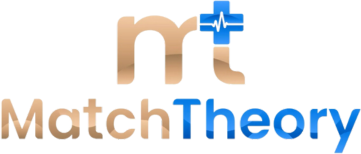© 2025 The Match Theory, All Rights Reserved.
Neurology Residency Match

If you’re applying to neurology residency, you’re probably captivated by the brain and nervous system, and ready to build a career in one of the most intellectually rewarding specialties in medicine. But how do you stand out in a competitive match season where programs are seeking more than just high test scores?
In this guide, we share proven neurology residency match tips from matched neurology residents and applicants, along with the latest 2024–2025 newly accredited neurology programs you should keep on your radar.
Why Neurology?
Neurology is a specialty rich in complexity and evolving science. With advancements in neuroimaging, epilepsy surgery, stroke intervention, and neuroimmunology, it’s a field that blends clinical problem-solving with academic curiosity.
📈 According to NRMP 2024 data:
-
94% of U.S. MD seniors matched into neurology
-
59% of IMGs applying to neurology matched, a notable increase from previous years
-
Neurology is increasingly competitive, especially at top academic centers
What Makes a Strong Neurology Applicant?
1. Show Long-Term Interest in Neurology
“I focused all my electives on stroke and EMG. It helped show that I wasn’t just trying out neurology, I was already in it.”
Dr. A.A., IMG, matched into a Chicago neurology programSuccessful applicants often complete:
-
U.S.-based neurology electives
-
Neuro volunteer work (e.g., dementia advocacy, epilepsy foundations)
-
Early involvement in neurology interest groups (SIGs)
2. Engage in Research, But Keep It Practical
“I presented a poster on migraine triggers in women. Nothing flashy—but it proved I was invested in clinical questions.”
Dr. R.P., IMG with a Step 1 score of 215, matched in the South
Most successful applicants had:
-
Case reports or posters submitted to AAN
-
Literature reviews, QI projects, or participation in stroke registries
-
No requirement for first-author publication—but relevance to neuro matters
3. Secure At Least two Strong Neurology Letter
“My LOR from a neuro attending was key, she highlighted how I connected with patients and stayed curious about cases.”
Dr. S.T., PGY-2, NYU Neurology
Aim for:
-
3 LORs total, with at least one from a practicing neurologist
-
Letters from electives, sub-Is, or research mentors with direct supervision
4. Write a Thoughtful, Patient-Centered Personal Statement
“My statement opened with a quote from a patient with ALS. It grounded my story in real human experience.”
Dr. J.L., PGY-2, Mount Sinai Neurology
Focus your statement on:
-
One or two key patient encounters
-
What those moments taught you about neurology
-
Your future role as a neurologist (clinician, researcher, educator)
Get started with a compelling personal statement here Personal Statement Editing
5. Prepare for Interviews With an Academic Lens
Neurology interviews often include:
-
Case-based discussion (e.g., stroke localization, differential diagnosis for weakness)
-
Questions about ethical challenges and diagnostic uncertainty
-
Conversations about recent neuro research or public health topics
Prep Tip: Read 1–2 articles from Neurology, JAMA Neurology, or Brain before your interviews to stay current.
Red Flags? You’re Not Alone
“I had a Step 1 attempt and a 2-year gap. I explained it in the ERAS supplemental, leaned on strong clinical LORs, and prepared like crazy for interviews with Matchtheory’s Interview Preparation”
Dr. F.A., IMG, now at University of Kentucky Neurology
If you have red flags:
-
Use the ERAS supplemental section to explain gaps or attempts clearly
-
Focus on growth, resilience, and what you’ve done since
-
Apply broadly, especially to new or community-affiliated programs
🆕 Newly Accredited Neurology Programs for 2024–2025
Each year, the ACGME approves new neurology programs. These newly accredited programs may offer excellent opportunities, particularly for IMGs or reapplicants, because of their flexible and inclusive selection criteria.
Here are the 9 newly accredited neurology residency programs for the 2024–2025 academic year:
| Program Name | Program Director | Location | Accreditation Date |
|---|---|---|---|
| TMC Health Medical Education (THMEP) | Dr. David Teeple | Arizona | 01/23/2025 |
| Univ. of Arkansas for Medical Sciences (Regional Centers) | Dr. Jay P. Hinkle | Arkansas | 04/02/2025 |
| Sutter Health Program | Dr. Shubhangi Chitnis | California | 04/02/2025 |
| AdventHealth Florida | Dr. Anwar Ahmed / Dr. Joseph Campellone Jr. | Florida | 04/02/2025 |
| Abbott-Northwestern / Allina Health | Dr. Rammohan Sankaraneni | Minnesota | 01/23/2025 |
| Inspira Health Network | N/A | New Jersey | 01/23/2025 |
| Hackensack University Medical Center | Dr. Colum Amory | New Jersey | 04/02/2025 |
| Baylor University Medical Center | Dr. Haseeb A. Rahman | Texas | 04/02/2025 |
| Old Dominion University Program | Dr. James R. Wyant | Virginia | 04/02/2025 |
📌 Tip: These programs may not yet be listed in all databases. To stay informed about the latest program accreditations, regularly check the ACGME’s official website, particularly the List of Newly Accredited Programs and FREIDA listings, which provide up-to-date information on program accreditations across all specialties.
✅ Final Tips to Boost Your Neurology Match Chances
-
Apply early and broadly (especially if IMG or reapplicant)
-
Target programs with IMG history and new accreditations
-
Prioritize research, letters, and interview prep
-
Consider TY or prelim IM options as backup
-
Be authentic—neurology values curiosity, humility, and patient-centered care
- Have a dedicated physician mentor to guide you with the entire residency application process
💬 Ready to Strengthen Your Neurology Application?
Whether you’re applying for the first time or reapplying after a previous cycle, personalized guidance can make all the difference. Join our list to work with your personalized physician mentor
📩 Comment below or book a free 15-minute consult here Scheduling to review your neurology application strategy—from research to LORs, personal statement, ERAS CV/Application, to interviews.
Share the Post:
